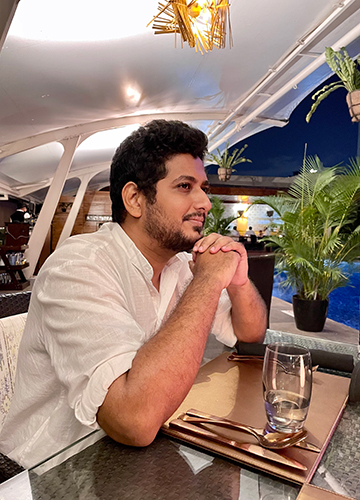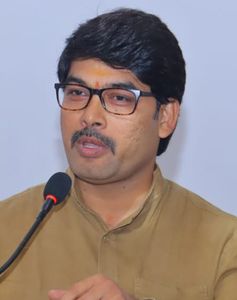A FEW POPULAR HINDI crime-drama series on streaming platforms are rooted in college and university life in Uttar Pradesh. The antagonist or the protagonist is usually exposed to the world of politics in their campuses, which marks the turning point in their lives. Preetham Gampa, too, was introduced to politics at his campus―IIT Kanpur―and has ended up working for politicians. Though he studied chemistry, he decided to become a poll strategist. Looking back, the 28-year-old said: “My future would have been different had I graduated from any other IIT.”
Ahead of the 2017 assembly elections, IIT Kanpur saw a flurry of political activity―awareness sessions, discussions and party-sponsored meetings. A startup Preetham and friends had launched on campus around the same time took on a political hue as his seniors sub-contracted promotional work for a national party to him. Soon, Preetham appeared for the campus interview of Prashant Kishor’s I-PAC and cracked it. At the renowned political consultancy firm, he gained invaluable experience.
Preetham, who hails from Telangana, was involved in two of the biggest padyatras in recent years in the Telugu states. In 2018, on behalf of I-PAC, he was on the ground coordinating with local leaders of the YSR Congress Party during then opposition leader and current Chief Minister Y.S. Jagan Mohan Reddy’s padyatra in Andhra Pradesh. Between 2021 and 2023, as an independent consultant and strategist, he was in-charge of the route map and other logistics for YSR Telangana Party founder Y.S. Sharmila’s padyatra in Telangana.
“When I am active on the field, I often skip lunch as there is simply no time to eat,” he said. “In this field, there are no fixed working hours. You can expect a call in the dead of the night or receive a dressing down early in the morning.” There are times when he yearns for the corporate sector―“on scorching summer days, I think I should have taken up a job that would require me to be in an AC office”. But, on most days, Preetham’s passion outweighs the challenges. “I have learned to be patient as things work slowly in politics,” he said. “I have also understood how to execute big jobs with small teams.”
After Sharmila’s party engaged with the Congress for a merger, Preetham moved on and is now gearing up to assist a senior leader of a regional party in the upcoming assembly polls and general elections. Even as the candidates battle it out, Preetham will face tough competition from his own peers―a new crop of young strategists, survey experts, consultants, social media marketers, researchers and data analysts. I-PAC is not in the fray, but there are at least two dozen individuals and startups working for various candidates, both party-affiliated and independent.
In political consultancy circles, there is a joke that beneath the surface of every firm lies the same repository of data. This voter-specific data apparently covers crores of voters and is used to plan strategies and campaigns. It is an open secret in the industry that when employees switch roles or jobs, the data follows. This has raised concerns about leaks.
Mohammed Khurshid Hussain, who runs YAM consultancy, said that upholding trust and integrity is key to maintaining significance. To address the anxieties of clients, he limits data access within his team and assesses trustworthiness of recruits. Khurshid, who is currently working with six candidates from the same political party, said the hype surrounding data is overrated as it can only be used to understand the facts and is not a major factor in influencing the results.
Among the services offered by his 30-member team is data analysis for customising apps for the candidates, conducting surveys, gathering intelligence, managing social media accounts, content creation, digital marketing, campaign design, strengthening party cadre and liaising with the media.
An engineering graduate with seven years of experience in this field, Khurshid has been involved in numerous state elections, including the recent Karnataka polls. He believes in following a “bottom-to-top” approach, focusing on MLA candidates and lower-ranked politicians and eventually evolving to handle political parties. He said his drive comes from wanting to help the public. “Since we have data and intelligence reports, we can tell politicians what to do and they will listen,” he said. “This way we can solve problems faced by the people.”

Few can dispute the influence of social media during campaigns. The in-house teams of political parties are trying to outdo each other in increasing their online reach and crafting a favourable public image. The Bharat Rashtra Samithi (BRS) has adopted a multifaceted approach in the virtual world, live streaming their events, reaching out to informed audience on LinkedIn and having dedicated social media warriors. Over the last six months, the social media team has come up with a fresh strategy.
“In 2018, our primary focus was Facebook,” said a BRS social media team member who requested anonymity. “Now, Facebook is almost obsolete. This time, our focus is on Instagram reels and YouTube shorts.” The source also added that the posts on the party’s pages, which used to get few thousands of views, is now crossing a million― a sign that they are grabbing the attention of the youth. The party has also come up with a unique initiative to educate first-time voters on its history and Chief Minister K. Chandrashekar Rao’s struggle for a separate Telangana. To achieve this, old photos and videos are being recycled to connect emotionally with the target demographic. A dedicated, 25-member team manages the pages across platforms.
It is also crucial for the parties to monitor their competitors closely. In this elections, two national parties are receiving support from two big organisations. The Congress has engaged Sunil Kanugolu’s Mindshare. Kanugolu’s role in the party’s campaign saw him being elevated to the role of chief adviser to Karnataka Chief Minister Siddaramaiah. The BJP is assisted by Nation with Namo, which conducts competition analysis and develops strategies based on the opponent’s moves. Though the narrative revolves around Prime Minister Narendra Modi, it also handles local social media pages and churns out Telugu content.
What about the money? How financially lucrative is this career? “The financial part is tricky,” said A. Satheesh Kumar, a poll strategist who is working for half a dozen clients. “If the money is legitimate, then there is no issue. But if the client wants to link your fees to his black money, then it causes a headache. Timely payments can also be problematic as the industry is not yet fully professional.”
Satheesh, a journalist-turned-poll strategist, transitioned into the role after gaining experience and building a network while covering multiple elections in different states. He believes that outsourcing election work has become mandatory for leaders in today’s political landscape. Given the demand for people with diverse skill sets, he is in the process of hiring nearly 100 people. He says the lack of proper training institutions compels him to assume the role of trainer as well. “There are few institutes that provide training in psephology or election-related specialities,” he said. “I have no choice but to train people after I hire them.”
One notable aspect of this group of election professionals is the lack of female representation. The field remains predominantly male-dominated, with only a few women found in larger teams. Sathya N.S.R. is an exception. A US-trained software engineer, she later pursued public policy studies at Osmania University in Hyderabad. After a stint as a public policy researcher at former bureaucrat and politician Jayaprakash Narayan’s Foundation for Democratic Reforms, she ventured into the world of election strategy.
Talking about the dearth of women in the field, she said gender bias and stereotypes could influence how women were perceived in political settings. “Additionally, the unpredictable nature of work meetings, which can extend late into the night, and the possibility of encountering unsafe environments, especially crowded or isolated interiors, can limit opportunities to build a professional network or move up the ladder,” she said, adding that her defence background helped her to be resilient and find her footing in the industry.
Sathya hopes that the system develops a more inclusive environment for women as she feels that women with good communication skills and emotional intelligence can be valuable assets in the field.



